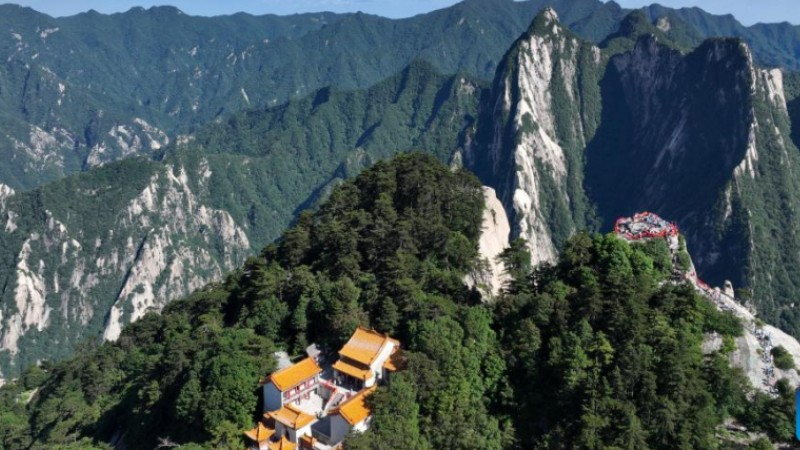"King in the forest" revived through protection in NE China

This photo taken on May 24, 2023 shows red pine saplings planted at a forestry of Heilongjiang Yichun forest industry Refco Group Ltd in Yichun, northeast China's Heilongjiang Province. (Xinhua/Zhang Tao)
HARBIN, June 26 (Xinhua) -- Growing in the heartland of the Lesser Khingan Mountains, vast red pine forests have been the iconic view of the city of Yichun, northeast China's Heilongjiang Province, making it the country's major lumber producer for decades.
To counter deforestation, the locals have introduced new ways of balancing red pine protection and economic growth, reviving the red pine forest to its former glory.
In a greenhouse of a red pine seedling nursery base in Yichun, workers were checking the irrigation equipment.
Under the roof, rows of red pine seedlings are greened by newly-grown pine needles, thriving in the light substrate mesh bag.
A light substrate mesh bag is a cup-shaped fabric container holding a mixture of plant ash, perlite, and fertilizer, according to Wang Lixin, deputy director of the forest ecology construction department of the Shangganling forest bureau, under Heilongjiang Yichun Forest Industry Group Co., Ltd.
There are over 60,000 light-substrate-grown seedlings in this greenhouse, all transplanted from a nursery garden around May 1, said Wang. In about one month, these 8 cm-tall seedlings will grow to about 15 cm, reaching the standard of planting on the mountain.
Traditionally, red pine seedlings need four years of nursery before planting, with an average survival rate of around 80 percent. With light substrate, the nursery period is reduced to two years and two months, and the survival rate is increased to more than 95 percent, Wang said.
"Light substrate has completely changed our traditional planting pattern," Wang said. "Now, we are able to plant red pines in spring, summer, and autumn."
About 60 percent of the world's red pines are growing in China, with more than half of them scattered in the Lesser Khingan Mountains.
Known as the "King in the forest," red pine plays an important role in the ecosystem of the Lesser Khingan Mountains, shouldering vital responsibilities, including carbon sequestration, climate regulation, and water conservation.
Red pine had supported a booming lumbering industry in Yichun for decades. However, with the gradual depletion of forest resources, the people in Yichun stopped commercial logging of natural forests in 2013, while exploring new methods to protect the valuable tree species.
A few steps from the greenhouse sits a light substrate mesh bag factory.
"We have already produced 6.8 million light substrate mesh bags since the end of 2021, and the light substrate nursery technique is being popularized in many other places," said Wang.
According to Yang Yumei, with Heilongjiang Yichun Forest Industry Group Co., Ltd., 12 light substrate nursery bases have been established by the Group, producing 252 million seedlings, with 46 million of them grown from light substrate mesh bags.
Protecting red pines requires much more than nurturing strong seedlings. To transform the lumbering-reliant economic structure, Yichun has actively promoted diversified industries, embarking on a path of shared prosperity for people and red pines.
To support forest protection and increase the workers' income, the Group has contracted parts of the red pine forest to its workers.
You Fengjun, an employee of the Shangganling forest bureau, is among these contractors. Since 2020, You has contracted and managed over 300 mu (20 hectares) of red pine forest, earning more than 20,000 yuan (about 2,785 U.S. dollars) each year selling harvested pinecones.
Planted under the towering red pines, the blueberries on the vines have also earned a fortune for many people.
In the filling workshop of Zhiyou, a food company in Yichun, production manager Yu Wei was checking the status of a beverage filling machine.
"I used to work as a lumberjack and a driver for the Group," said Yu. "After the factory was built here in 2014, I decided to join in for the blueberry business."
Yu said that the factory has been expanding its production since 2015, with its products expanded from dried blueberries to various types of blueberry wine and juice beverages.
The company's output value was around 23 million yuan last year, and it plans to double the amount of blueberry raw materials this year, Yu said.
Powered by the flourishing agricultural and forestry industries utilizing red pine resin, edible fungi, and small berries, Yichun has paved the way for the return of its economic momentum as the "King in the forest."
According to Liu Yu from the Yichun forestry and grassland administration, Yichun has achieved a net annual increase in forest stock of over 10 million cubic meters in the past 10 years.
"With an eco-friendly way for forest cultivation, the forest reserve in Yichun has reached 375 million cubic meters, and the forest coverage rate has topped 83.8 percent," Liu said.
Photos
Related Stories
- Achievements of China's green Great Wall---the Three-North Shelterbelt Forest Program
- Chinese vice premier stresses forest, grassland fire prevention
- Former mine site transformed into forest in central China
- Accelerating rate of mountain forest loss globally threatens biodiversity hotspots: study
- Life in the forest: Dancing with nature
Copyright © 2023 People's Daily Online. All Rights Reserved.









